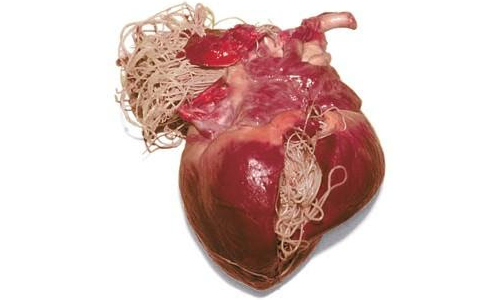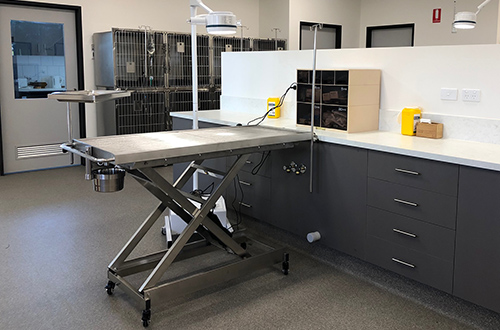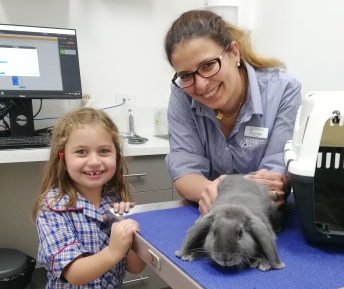HEARTWORM PREVENTION

Contracting heartworm can be a terrible experience for dogs in particular and their owners alike.
The most severe symptoms of the disease are etremely unpleasant for dogs, and the effective treatment of the condition even more so, while cats are not altogether immune from contracting heartworm either.
While heartworm is less prevalent in most areas of Melbourne than in tropical regions of Australia, because of the severity of the condition, and the relative ease of preventing against it, all Melbournedog owners are recommended to protect their dog from heartworm with anti-heartworm medication.
This medication can be administered in many cases via an all-in-one anti-parasite medication.
At Clyde Veterinary Hospital, we have a strong “passion for prevention”, and we will put together a preventative care plan for your dog that is both comprehensive in its protection, and easy for you to administer.



Payment Plans



CLINICAL HEARTWORM PREVENTION
Heartworm Protection

Eliminate the Risk

Preventative Care Focus

Although heartworm in Australia was once considered mainly a problem of tropical and subtropical coastal regions, in recent decades it has become increasingly prevalent in Victoria.
The condition can be extremely serious and often deadly. We strongly recommend that dog owners consider putting a preventative anti-heartworm regime in place for them.
Talk to us at Clyde Veterinary Hospital about an effective anti-heartworm regime for your pet, based on their unique needs and circumstances.
Over 30 species of animals can be infected with the heartworm, including cats, foxes, ferrets, and in extremely rare cases, humans. One recent study found 7% of foxes in the Melbourne region carry heartworm.
And because the worm’s eggs are borne by mosquitoes, your pet doesn’t need to come into contact with an infected animal to contract heartworm.
At Clyde Veterinary Hospital, we place a huge premium on preventative veterinary care, and an effective regime for managing the risks to your dog heartworm and other parasites. That’s why we are Casey’s #1 destination for preventative pet health care.
Our state of the art veterinary clinic boasts dedicated dog and cat areas with species-specific anti-stress medication diffusers, so your pet will come away from their trip to Clyde Vet smiling like never before.

JUNE SPECIAL PROMOTION

Buy a 3 or 6 month pack of NEXGARD SPECTRA® at Clyde Vet
Get a FREE BONUS month, valued over $27.99
NEXGARD SPECTRA® is a tasty beef-flavoured chew that dogs love
Just one chew, once a month protects against fleas, ticks, mites, heartworm & intestinal worms!
ph. 9052 3200
FAQs
Do I Really Need to Worry About Protecting My Dog or Cat Against Heartworm in Melbourne?
Heartworm thrives in tropical areas, but it is becoming increasingly common in temperate zones in Australia, and in Melbourne in particular. A recent study showed that roughly 7% of all foxes in the Melbourne region are infected with heartworm. And because the parasite’s larva are borne by mosquitoes, your pet never even needs to come in to direct contact with another infected animal in order to develop the condition. Since 2014, nearly 1500 cases of heartworm have been reported nationally, with over 46 of these in Victoria.
While heartworm usually presents as a minor condition in cats, the story is different for dogs, for whom the condition can often prove fatal if not treated effectively. We strongly recommend that all dog owners in particular think seriously about having their pets treated regularly with anti-heartworm medication. Talk to the preventative medicine experts at Clyde Veterinary Hospital about an effective preventative regime for your pet.

Incidence of Heartworm in Australia
Should I Have My Dog Protected Against Heartworm?
Yes. Heartworm in dogs is always a serious and life-threatening condition. The worms can seriously damage not just your dog’s heart tissue, but also their lungs, liver and other vital organs. We strongly recommend maintaining a preventative care regime against heartworm for all dogs in Melbourne.
Should I Have My Cat Protected Against Heartworm?
While it is certainly possible for your cat to develop heartworm, cats are not a natural host for the parasite, and consequently the worms rarely develop to an adult stage in felines. In rare cases where the worms do mature to adulthood, they can still damage your cat’s heart and internal organs, but the infestation is usually significantly less pronounced than is seen in dogs and so more difficult to diagnose. It is ultimately your choice whether to have your cat protected, but with heartworm incidence on the rise in Melbourne, it is often the right choice for complete peace of mind. Talk to us at Clyde Vet about your cat’s unique circumstances to learn more.
How is Heartworm Transmitted Between Animals?
Microscopic heartworm larvae (microfilariae) present in the blood system of an infected animal are carried by mosquitoes, which can then pass the larvae into the blood system of any other animals which they prey on. It then takes around six and a half months for the larvae to develop into adult worms in their new host. For this reason, a diseased animal may show no initial symptoms before suddenly becoming very sick.
How Regularly Does Anti-heartworm Medication Need to Be Administered to a Dog or Cat?
We recommend administering yearly anti-heartworm medication for dogs and monthly for cats regularly on the same day of each month (the first is the easiest to remember). While summer is regarded as “mosquito season” in Melbourne, mosquitoes are present in Victoria all year round, and often thrive after periods of heavy rain. For this reason it’s important to ensure that your pet is protected all year round.
What are the Symptoms of Heartworm Disease?
Symptoms of heartworm disease in dogs and cats may include a mild persistent cough, reluctance to exercise, fatigue after moderate activity, decreased appetite, and weight loss. The disease can develop rapidly, and once the heartworm reaches maturity, dogs may become prone to heart failure or complications in other vital organs, and display a swollen belly due to excess fluid in the abdomen. If your dog or cat is showing any of these symptoms, we recommend that you should have them urgently tested for heartworm.
Will Heartworm Treatment Protect My Dog or Cat Against Other Intestinal Worms?
It depends on the choice of treatment, but several of the most common anti-heartworm medications do also work to prevent your pet becoming host to a range of common parasitic worms, including tapeworm, hookworm, ringworm and roundworm. Talk to us at Clyde Vet about the best option for your pet’s comprehensive long term preventative health plan.


